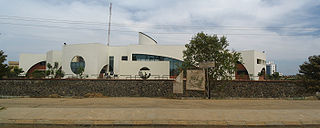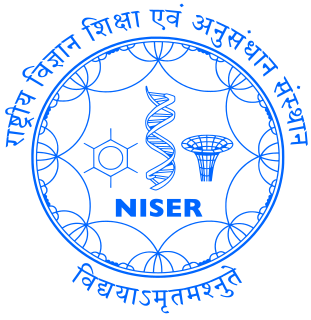
Shiraz Naval Minwalla is an Indian theoretical physicist and string theorist. He is a faculty member in the Department of Theoretical Physics at Tata Institute of Fundamental Research, Mumbai. Prior to his present position, Minwalla was a Harvard Junior Fellow and subsequently an Assistant Professor at Harvard University.

Tata Institute of Fundamental Research (TIFR) is a public deemed research university located in Mumbai, India that is dedicated to basic research in mathematics and the sciences. It is a Deemed University and works under the umbrella of the Department of Atomic Energy of the Government of India. It is located at Navy Nagar, Colaba, Mumbai, with an affiliated campus in Serilingampally near Hyderabad. TIFR conducts research primarily in the natural sciences, mathematics, the biological sciences and theoretical computer science.

The Max Planck Institute for Gravitational Physics is a Max Planck Institute whose research is aimed at investigating Einstein's theory of relativity and beyond: Mathematics, quantum gravity, astrophysical relativity, and gravitational-wave astronomy. The Institute was founded in 1995 and is located in the Potsdam Science Park in Golm, Potsdam and in Hannover where it is closely related to the Leibniz University Hannover. The Potsdam part of the institute is organized in three research departments, while the Hannover part has two departments. Both parts of the institute host a number of independent research groups.

Jayant Vishnu Narlikar is an Indian astrophysicist and emeritus professor at the Inter-University Centre for Astronomy and Astrophysics (IUCAA). He developed with Sir Fred Hoyle the conformal gravity theory, known as Hoyle–Narlikar theory. It synthesises Albert Einstein's theory of relativity and Mach's principle. It proposes that the inertial mass of a particle is a function of the masses of all other particles, multiplied by a coupling constant, which is a function of cosmic epoch.

Chennai Mathematical Institute (CMI) is a research and education institute in Chennai, India. It was founded by the SPIC Science Foundation in 1989, and offers undergraduate as well as postgraduate programmes in physics, mathematics and computer science, besides its key strength in the form of high-end research in Mathematics. CMI is noted for its research in the field of algebraic geometry, in particular in the area of moduli of bundles.

Raman Research Institute (RRI) is an institute of scientific research located in Bangalore, India. It was founded by Nobel laureate C. V. Raman. Although it began as an institute privately owned by Sir C. V. Raman, it is now funded by the government of India.

Thanu Padmanabhan was an Indian theoretical physicist and cosmologist whose research spanned a wide variety of topics in gravitation, structure formation in the universe and quantum gravity. He published nearly 300 papers and reviews in international journals and ten books in these areas. He made several contributions related to the analysis and modelling of dark energy in the universe and the interpretation of gravity as an emergent phenomenon. He was a Distinguished Professor at the Inter-University Centre for Astronomy and Astrophysics (IUCAA) at Pune, India.

The National Institute of Science Education and Research (NISER) is an autonomous premier public research institute in Jatani (Khordha), Odisha, India under the umbrella of Department of Atomic Energy, Govt. of India. The institute is a constituent institution of Homi Bhabha National Institute (HBNI). The prime minister, Manmohan Singh (2004–2014), laid the foundation stone on August 28, 2006, establishing the institute along the lines of the IISc in Bangalore, and its seven sister institutions, the IISERs, established at Pune, Mohali, Kolkata, Bhopal, Berhampur, Tirupati and Thiruvananthapuram in India.

Homi Bhabha Centre for Science Education (HBCSE) is a National Centre of the Tata Institute of Fundamental Research (TIFR), Mumbai, India. The broad goals of the institute are to promote equity and excellence in science and mathematics education from primary school to undergraduate college level, and encourage the growth of scientific literacy in the country. To these ends it carries out a wide spectrum of inter-related activities, which may be viewed under three broad categories:

Rajesh Gopakumar is a theoretical physicist and the director of the International Centre for Theoretical Sciences (ICTS-TIFR) in Bangalore, India. He was previously a professor at Harish-Chandra Research Institute (HRI) in Prayagraj, India. He is known for his work on topological string theory.

Madabusi Santanam "M. S." Raghunathan FRS is an Indian mathematician. He is currently Head of the National Centre for Mathematics, Indian Institute of Technology, Mumbai. Formerly Professor of eminence at TIFR in Homi Bhabha Chair. Raghunathan received his PhD in Mathematics from (TIFR), University of Mumbai; his advisor was M. S. Narasimhan. Raghunathan is a Fellow of the Royal Society, of the Third World Academy of Sciences, and of the American Mathematical Society and a recipient of the civilian honour of Padma Bhushan. He has also been on the Mathematical Sciences jury for the Infosys Prize from 2016.

Centre for Excellence in Basic Sciences is an autonomous institute with an affiliation to the University of Mumbai. It was set up in the University of Mumbai by the Department of Atomic Energy (DAE) in collaboration with the university. This institute offers undergraduate science education and research opportunities. It aims at improving the quality of basic science education in the country at the undergraduate level and developing a pool of scientists for the various scientific works of the country. The Institute was established on 17 September 2007 by Dr R. Chidambaram, Principal Scientific Advisor to the Government of India. In 2016, the institution was granted the status of "Aided Institution" under the Department of Atomic Energy by the Government of India.
Sandip Trivedi is an Indian theoretical physicist working at Tata Institute for Fundamental Research (TIFR) at Mumbai, India, while he is its current director. He is well known for his contributions to string theory, in particular finding the first models of accelerated expansion of the universe in low energy supersymmetric string. His research areas include string theory, cosmology and particle physics. He is now member of program advisory board of International Center for Theoretical Sciences (ICTS). He is also the recipient of the Infosys Prize 2010 in the category of Physical Sciences.

Prahalad Chunnilal Vaidya, was an Indian physicist and mathematician, renowned for his instrumental work in the general theory of relativity. Apart from his scientific career, he was also an educationist and a follower of Gandhian philosophy in post-independence India, specifically in his domicile state Gujarat.
C. V. Vishveshwara was an Indian scientist and black hole physicist. Specializing in Einstein's General Relativity, he worked extensively on the theory of black holes and made major contributions to this field of research since its very beginning. He is popularly known as the 'black hole man of India'.
Amol Dighe is a Professor of Physics in Tata Institute of Fundamental Research, Mumbai, India. He studied in Saraswati Secondary School, Thane, Maharashtra up to 10th grade and attended D. G. Ruparel College for the next 2 years. He was awarded the Shanti Swarup Bhatnagar Prize for science and technology, the highest science award in India, for the year 2013 in physical science category. His main research interest is in the area of high energy physics with focus on particles known as neutrinos, their nature and the role they play in astrophysics and cosmology. Dighe completed his BTech in Engineering Physics (1992) from Indian Institute of Technology, Bombay, MS and PhD (1997) from University of Chicago. Later he did postdoctoral research at ICTP, Trieste, CERN and Max Planck Institute before joining TIFR as a faculty member in 2003. He is a fellow the Indian Academy of Sciences and has won the Swarnajayanti Fellowship from the Department of Science and Technology, Government of India.
Badanaval Venkatasubba Sreekantan was an Indian high-energy astrophysicist and a former associate of Homi J. Bhabha at the Tata Institute of Fundamental Research (TIFR). He was also a Dr. S. Radhakrishnan Visiting Professor at the National Institute of Advanced Studies, Bangalore.

The University of Niš Faculty of Science and Mathematics, also known as the Niš Faculty of Science and Mathematics, is one of the educational institutions of the University of Niš, Serbia.
Deepak Dhar is an Indian theoretical physicist and a distinguished professor at the department of physics of Indian Institute of Science Education and Research, Pune. Known for his research on statistical physics and stochastic processes, Dhar is an elected fellow of all the three major Indian science academies – Indian Academy of Sciences, Indian National Science Academy and National Academy of Sciences, India – as well as of The World Academy of Sciences. The Council of Scientific and Industrial Research, the apex agency of the Government of India for scientific research, awarded Dhar the Shanti Swarup Bhatnagar Prize for Science and Technology, one of the highest Indian science awards, for his contributions to physical sciences in 1991.













